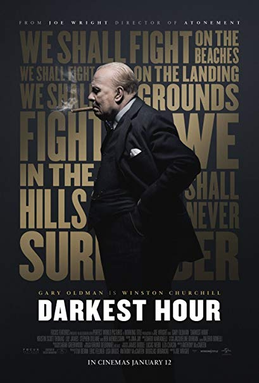
Review Summary: Oldman's performance and some strong moments aside, political war thriller doesn't meet expectations.
I'm not necessarily a history fanatic, but that doesn't mean I don't like historical films. When it truly engages the heart and keeps you in suspense, they can work resoundingly well. I was looking forward to Darkest Hour trying to shine a light on a story that is largely unfamiliar to American audiences: how the U.K. responded to the events of World War II.
Unfortunately, the final film doesn't achieve these goals. But, that doesn't mean it's for a lack of trying. Director Joe Wright's film does have a few great moments and a few great ideas, including ones that had me make comparisons to today's political climate. However, his execution of these ideas could have been smoother, and not involving a few talky scenes that didn't really advance the story.
One of the film's biggest positives for me, however, is that this film resists the temptation (mostly) to be a spectacle. There are a few impressive moments with the sets and visual effects, but this is more of an up close and personal character story. This is evident in a few scenes where Wright utilizes a slow-motion camera to have Winston Churchill watch the people as he rides by to try and get an idea of what they are thinking about. These scenes are excellently accompanied by Dario Marianelli's piano-based score, and some impressive cinematography. The camerawork in the Parliament scenes is impressively well-executed also (with a stunning closing shot in the final scene).
And speaking of Churchill himself, Gary Oldman is definitely Oscar-deserving here. Nearly-unrecognizable due to make-up and prosthetics, he uses an interesting accent and a convincing mix of a take-no-prisoners attitude and a generally reserved personality to recreate this historical figure astonishingly well. There are a couple of tense arguments between him and two or three other characters that are well-scripted and rank among the film's most engaging moments. The film's best scene, however, is when he goes on an underground subway to talk with the people about what they think he should do. His characters' ability to look at and treat people equally, regardless of age, gender or race is by all means a timely example for us today.
It is unfortunate then, that this scene is followed up by two or three long scenes that really weren't necessary in helping the story reach its' pulse-pounding conclusion. There are also a handful of other long discussions that may not have been necessary to extend the film out to a 2-hour running time. The first half of the film itself has a lighter, slightly humorous tone about it, before the film goes in a somewhat darker and serious direction in the second half. Perhaps a little more humor might would have helped the film altogether.
In the meantime, Lily James (from the recent Cinderella) plays Churchill's typewriter, Elizabeth Layton. She proves to be very emotionally effective in a handful of scenes, but she also disappears for quite a while in the second act. As Winston's wife, Kristin Scott Thomas is genuine, but restrained. Ben Mendelsohn plays King George VI, and does his best with what he is given.
As I mentioned before, the film explores several interesting ideas, such as the struggles of being an effective leader, the cost of freedom, the cost of war, and resisting political and controversial pressure. These are all things that anyone on either side of the political spectrum can relate to. At the same time, these ideas definitely would have been even more thought-provoking, however, if the tone and pacing of the story itself wasn't so uneven.
Fans of history and World War II probably will find it more appealing. And, honestly, I didn't find Darkest Hour to be a bad film. Oldman and some scenes do make a great impression. But, as a whole, I couldn't help but keep thinking this is one of those movies that tried so hard to deliver and engage, and yet came up way short.
Score: 6.3/10
Content Concerns for Family Viewing: Darkest Hour is rated PG-13 for "some thematic material". For the rating, the content is restrained. However, unless your middle schooler is a history buff, most around that age and younger will likely be bored.
Mild language includes one s-word, four uses of "d---", one of "Oh G**", and a few uses each of British profanities "bloody" and "b-gger". When flashing his "V" for victory sign, Churchill is told by someone that it means "up your bum" (they both laugh about it). Churchill drinks alcohol and smokes frequently. Some other characters drink and smoke too. There's some dishonesty out of not making the public unhappy. One moment shows Churchill getting out of a bath, warning his writer saying, "I'm coming out in a state of nature." (we only see his ankles and feet)
The only violence we see is a few bombs dropped on a small encampment from above (and a resulting explosion). We do see soldiers getting treated in a hospital with a few wounds seen. A close-up of a dead soldier's face is shown for a few seconds.